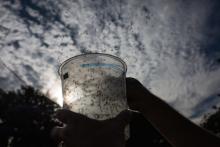
British manufacturer Oxitec says it has the answer to four very bad mosquito-borne viral diseases -- dengue, chikungunya, yellow fever and Zika.
And on Friday -- just as South Florida public health officials were announcing the Zika virus had claimed more victims -- the U.S. Food and Drug Administration was giving the biotech firm approval to run a field trial on its product in the Florida Keys. The trial would evaluate the product's effectiveness in reducing the population of hard-to-kill Aedes aegypti mosquitoes.
But, hold on. The "product" isn't a spray, it isn't some kind of additive. In fact, it's something the country has never seen before -- and at least one resident in the trial zone calls it "creepy."
What it does is involve the release of millions of the nation’s first genetically modified mosquitoes, hatched in a lab and pumped with synthetic DNA to try to kill Aedes aegypti mosquitoes.
The idea is to drastically reduce the population of the "bad" mosquitoes by freeing male mosquitoes that can't bite or transmit diseases with a specially made gene designed to kill their offspring after they mate in the wild.
Death to these flying menaces sounds great. Unless, of course, you live in Key Haven, where the field trial is set to run sometime after the November election. Key Haven is a small island of 444 affluent homes five miles northeast of Key West. A lot of Key Haven folks have spent the last four, nearly five years fighting the idea of being Oxitec's guinea pigs.
Oxitec Chief Executive Officer Hadyn Parry, who spoke with reporters in a conference call Friday to explain his product and field test and to answer questions, said the only poll he's seen shows more Key Haven residents are in favor of the test than oppose it. "We find when we meet people face to face, going door to door, and explain what we're doing and how the program works, we usually win their approval."
The company isn't ramming the test down residents' throats, Parry says. Years ago during a dengue outbreak, it was invited to Marathon by the Florida Keys Mosquito Control District. Now Oxitec has its lab in Marathon, same location as the Mosquito Control District offices.

Parry said Key Haven residents will vote in November in a non-binding referendum whether they want Oxitec to go ahead with the trial. "The final decision whether we release our 'Friendly Aedes' is the District's. But certainly we want the community's approval."
Oxitec has already conducted successful field trials in Brazil, Panama and the Cayman Islands, he said, each leading to a greater-than-90 percent reduction in the Aedes aegypti population.
Last year, the company published a paper showing that its release of GM mosquitoes in a suburb of Juazeiro, in Bahia state in Brazil, could — at least for a season — reduce the population of wild-type A. aegypti by as much as 90 percent. It argued that the sustained release of transgenic insects “would likely be sufficient to prevent dengue epidemics in the locality tested”.
Pedro Antonio de Mello, municipal secretary of health in Piracicaba, in the state of São Paulo, told Nature.com a similar trial conducted by Oxitec in his city has provided some real evidence of a decrease in dengue cases, although the results haven't been published. In a small, 5,000-person neighborhood within Piracicaba in which transgenic mosquitoes were released, confirmed cases of dengue have fallen from 132 in the 2014–15 dengue season to just 4 in 2015–16 so far. He says detailed epidemiological data from the trial is expected to be out later this year.
“We’re guinea pigs in their science experiment,“ said Dick Nalley, one of the Key Haven residents who have dotted their front yards with angry anti-field trial signs.
"If they've got the majority of Key Haven residents on their side, they certainly aren't the people on my street," resident Kathryn Lisle told Sunshine State News Friday. "Number 1, they don't have my permission to experiment on me and number 2, it's as if we're living in a scene from 'Jurassic Park' where the dinosaurs were all supposed to be one sex but nature found a way for them to make babies. This is too creepy."
“This could have a huge benefit for Key West,” says Michael Doyle, director of the county Mosquito Control District. “With traditional tools,” which, in Monroe County, include insecticide, larvaecide, a helicopter, and a nearly $16 million annual budget, “we eradicate only 50 percent of the Aegypti.” If Oxitec's genetic mutation strategy can eradicate up to 90 percent of the targeted mosquito, apparently for about the same price, then Doyle figures it's a win-win.
He also likes that Oxitec's mosquitoes won't have significant impacts on the environment, as sprays currently used do.
“Using the mosquitoes against themselves avoids two of the biggest problems — first, how to get the right chemicals to the elusive mosquitoes without causing collateral damage to beneficial animals,” Doyle said. “And second, how to find and repeatedly remove the thousands upon thousands of breeding spots that people unintentionally create all around our homes.”
Parry said Gov. Rick Scott has been kept abreast of Oxitec's progress and likely will watch the field trial carefully. "I haven't met with him personally, but his team contacted us before June and I know he's interested."
Reach Nancy Smith at nsmith@sunshinestatenews.com or at 228-282-2423. Twitter: @NancyLBSmith


